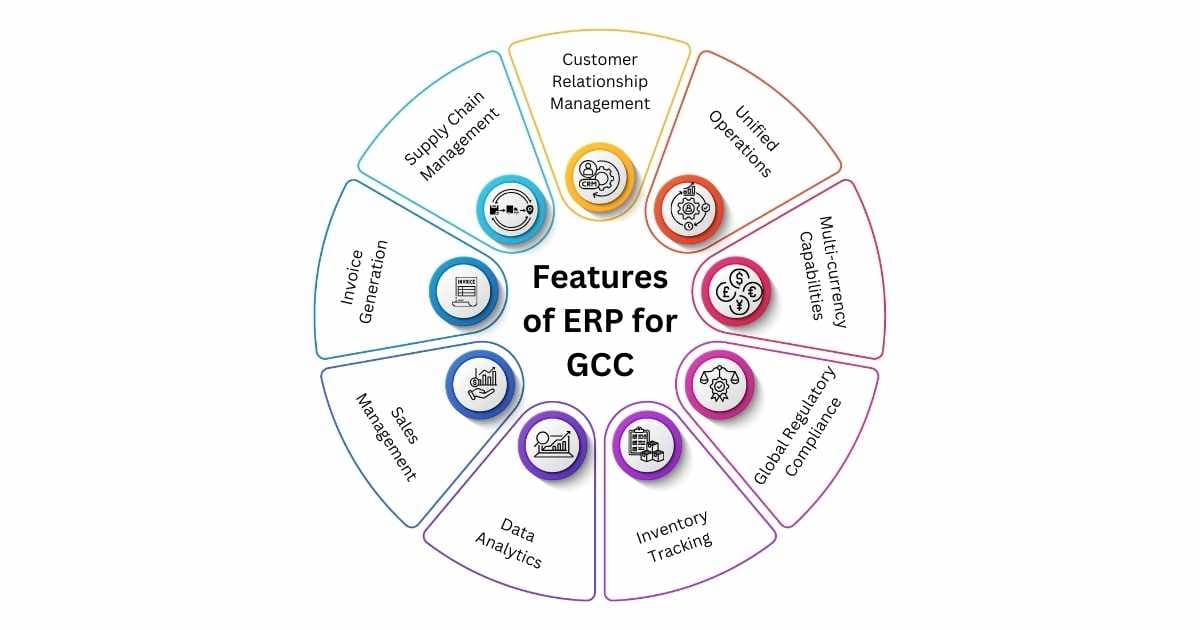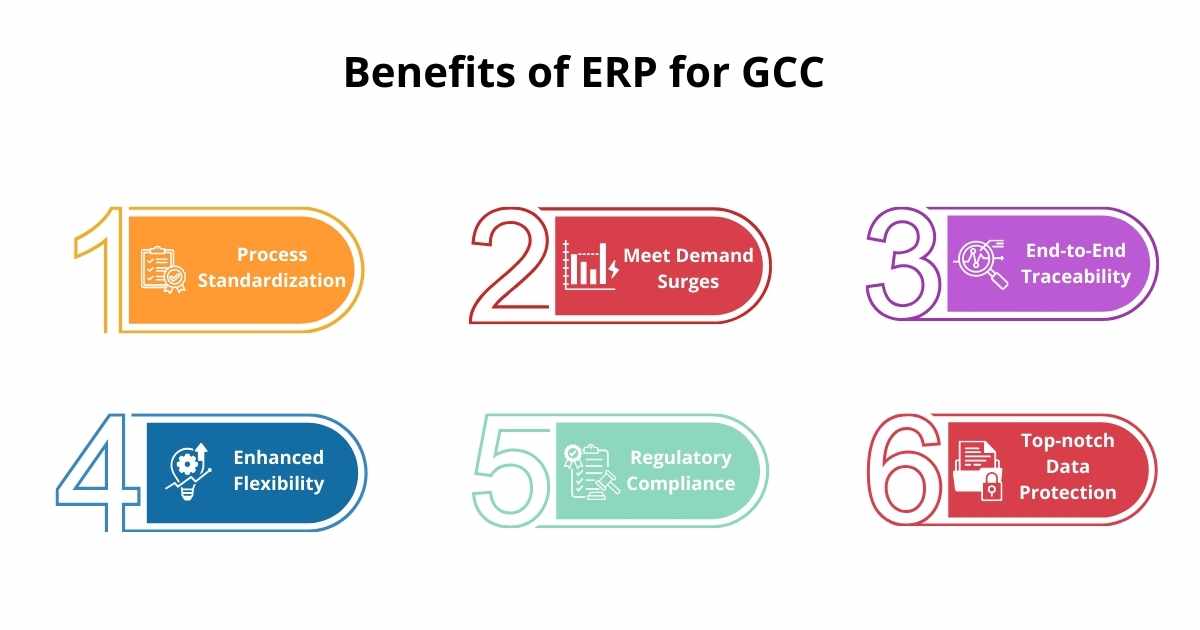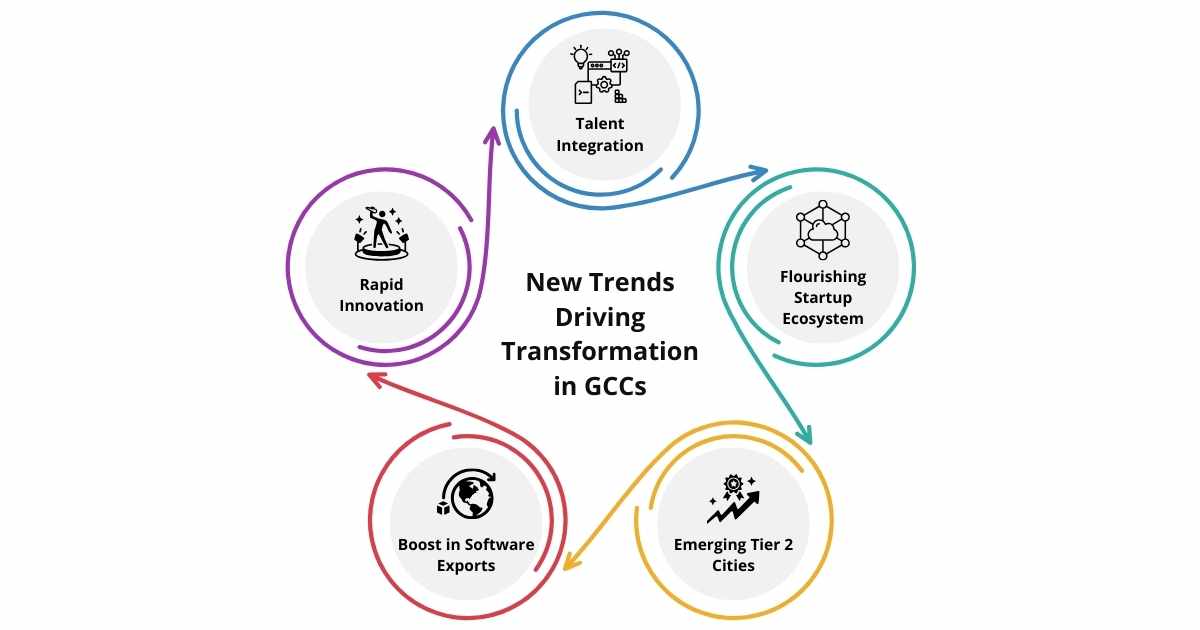Overview of the Global Capability Centers (GCC) in India
A Global Capability Centre (GCC) is a dedicated offshore unit set up by a multinational company in another country with an abundant talent pool and favorable economic conditions (such as India) to outsource its specific business operations — IT, manufacturing, research & development, and accounting, just to name a few. It is also known by other names such as Global In-house Centre, and Global Technology Centre.
According to a news report published in Money Control, India currently hosts over 1700 GCCs that employ over 19 million people. In FY2024, the industry witnessed a 40% surge in its export revenue amounting to $65 billion, compared to the preceding year. It is expected to reach $99 billion by 2030, and the number of GCCs is expected to increase to 2100. GCCs play a crucial role in India’s employment generation, wealth creation, and economic development.
What is an ERP for the Global Capability Centers (GCC)?
ERP for GCC is a data-driven solution that addresses the unique operational challenges faced by the GCC industry, and provides a comprehensive set of features from process optimization, project planning, inventory tracking, resource allocation, budgeting, and forecasting, to service management.
ERP Software plays a critical role in the growth and success of the GCCs. It empowers decision-makers with a holistic view of business operations, instant access to critical business processes, accurate sales tracking abilities, and efficient supply chain management.
Distinct Features of the ERP for Global Capability Centers (GCC)
Accounting Software for GCC will help you capitalize on the rapid expansion in the GCC and secure your position for sustained growth. Here are the distinct features of the ERP for GCC:
1. Customer Relationship Management
The CRM System builds a comprehensive database of your customers. It allows easier tracking & management of service records, transaction history, and consumer preferences to nurture existing relations and generate recurring revenue & cross-sales opportunities.
2. Unified Operations
ERP for GCC provides a centralized platform of information management that consolidates information from different sources. It can be especially useful if you’ve multiple business units at different locations. It will allow seamless data sharing between each unit.
3. Multi-currency Capabilities
Do you have multiple business units located across different parts of the world? If so, your ERP’s multi- multi-currency capabilities can be a great help. Your ERP will auto-convert transactions from the foreign rates to your base currency and help maintain accurate books of accounts & reduce conversion errors.
4. Global Regulatory Compliance
One of the biggest challenges faced by global companies is that of local regulatory adherence. ERP streamlines financial tasks according to local laws and compliance protocols to enhance accuracy, reduce the potential for errors, and maintain audit trails.
5. Inventory Tracking
The Inventory Management System actively monitors your inventory levels and automatically alerts you whenever it reaches a certain threshold. ERP implementation brings better accuracy in the inventory counts, eliminates human errors, and reduces the potential risks of stock-outs & excessive stocks.
6. Data Analytics
Enterprise Resource Planning software converts vast amounts of data into short actionable insights that drive smart & informed decision-making and shape your growth journey. For example, Manufacturing ERP Software empowers manufacturers with intuitive charts, reports & customizable dashboards to accurately predict demand for their products.
7. Sales Management
The Sales Management System plays a critical role in tracking & boosting the effectiveness of the company’s marketing campaigns. It provides critical tools required for optimizing sales performance and anticipating & generating revenues.
8. Invoice Generation
ERP for GCC deeply integrates with your company’s accounting systems. It automates invoice generation irrespective of whether you use single or multiple billing methods. For example, food producers use ERP for food industry to automate the billing & invoicing to retailers, wholesalers, distributors, and final consumers.
9. Supply Chain Management
ERP for Supply Chain Management provides deep insights into the entire process from the procurement of raw materials and quality control to final delivery to the consumers. It enables you to identify inefficiency at every stage, gain efficiency throughout the supply chain operations, and provide a superior customer experience.
Fundamental Benefits of the ERP for Global Capability Centers (GCC)
Enterprise Resource Planning tools are gaining increasing popularity among the GCCs, particularly because of the various useful benefits they offer.
1. Process Standardization
When your data is stored in multiple spreadsheets scattered across different departments, it can pose a significant challenge in maintaining consistency and standardizing your processes. Accounting software for GCC stores your data in a centralized system with a common structure and format to facilitate the same quality of experience across different departments.
2. Meet Demand Surges
The Warehouse Management System facilitates easy scanning of warehouse items through RFID tags. It prevents your items from being lost, forgotten, or misplaced. With an efficient warehouse system in place, your company is well-prepared to face seasonal demand surges and capture new opportunities.
3. End-to-End Traceability
Accounting software for GCC provides end-to-end traceability into inventory management through serial number tracking, lot tracking, and batch tracking. For instance, Pharma ERP Software aids in efficient inventory planning, resource allocation, and market recall in the event of safety issues or a risk of potential legal action.
4. Enhanced Flexibility
ERP for GCC is a fully flexible and customizable solution that meets your changing business needs. The Enterprise Resource Planning tool is built to accommodate changing business needs (such as a surge or drop in the market demand) without affecting your performance & efficiency.
5. Regulatory Compliance
Businesses of all sizes and types have to follow the local Government regulations. Unfortunately, these regulations are complex in nature and they keep changing from time to time. ERP for GCC keeps an eagle’s eye on the changing requirements and ensures your business adheres to the regulatory requirements to prevent fines, penalties, and legal proceedings.
6. Top-notch Data Protection
Businesses operating in certain countries and regions have to adhere to strict data regulatory standards. Accounting software for GCC comes with top-notch File Encryption and superior Role-based Access Permissions. It converts human-readable text into ciphertext to hide confidential business data from unauthorized people. The role-based access permission limits access to the data to only specific individuals in a limited scope (for example, only read permissions, both read & write permissions, etc.)
New Trends Driving Transformation in the GCCs in India
Now, let’s discuss the new trends driving transformation in the GCCs in India:
1. Seamless Talent Integration
India is well-known as a talented superpower in various fields such as technology, engineering, and finance. The yearly influx of highly skilled youngsters, lower talent costs, and a stable economic environment make India a globally preferred destination for most MNCs.
2. Flourishing Startup Ecosystem
GCCs face various challenges. Some of them are technical complexities and siloed automation (departments and processes operating in isolation). By collaborating with Indian startups, they gain better outreach and deeper market insights into customer needs.
3. Emerging Tier 2 Cities
Tier 1 cities such as Mumbai, Pune, Bengaluru, Hyderabad, Delhi NCR, and Chennai have long been prime destinations for GCC setups in India. However, Tier 2 Indian cities such as Chandigarh, Vadodara, Jaipur, Visakhapatnam, and Kochi are fast emerging as favorable destinations due to lower infrastructure & talent costs.
4. Boost in Software Exports
India has witnessed tremendous growth in software exports which constitute a major part of the total revenue. MNCs across the world view India as a prime destination to broaden their operations and foster growth.
5. Rapid Innovation
In recent years, India has experienced rapid innovation and modernization of technology. An increasing number of GCCs want to gear up for success by becoming a part of rapid innovation and technological transformation.
Final Thoughts
In the last five years, India has experienced tremendous growth in the GCC industry and it is only expected to continue in the near future amid the availability of a large talent pool, innovations, structural reforms, and a progressive policy framework in place. ERP for GCC is expected to play an instrumental part in streamlined automation and enhanced data analytics, which collectively contribute to the industry’s success. It will emerge as a vital & indispensable tool for the success of modern organizations.
Sage X3 is a multi-company, multi-lingual, and multi-currency tool packed with a plethora of business-critical modules that help you oversee your business operations, seek new opportunities, and address critical pain points. It empowers decision-makers with insight-driven data and powerful analytical reports to reduce lead times, meet demands on time, increase cash flow, respond faster to change, and outpace your competitors.
FAQs
1. What is the ERP for GCC?
ERP for GCC is a specialized solution that caters to the needs of the GCCs. It consolidates data from different business departments and builds a network of interconnected processes to achieve better outcomes and improve response rates.
2. What are the Global Capability Centers?
Global Capability Centres are hubs fully owned and operated by multinational corporations and established in countries with vast availability of skilled professionals and favorable factors for value creation and wealth generation.
3. Which Factors Contribute to the Growth of the Global Capability Centers?
India is a center of Global Capability Centres due to several favorable conditions.
- Innovations & Tech Adoption: In recent years, India has made tremendous advances in innovation and adoption of modern technology.
- Vast Talent Pool: India has an abundant supply of workforce with skillsets critical for the company’s growth and success.
- Booming Startup Environment: India hosts the world’s third-largest startup ecosystem, and there has been a surge in startups and their funding.
- Stable Political & Economic Conditions: Indian economic and political conditions are mostly stable despite wars and other global geopolitical challenges.
4. How Does ERP Support Regulatory Compliance within the GCC?
ERP Application supports the regulatory compliance in various ways:
- Stay up-to-date with evolving regulatory standards
- Maintain complete audit trails for enhanced transparency
- Covers a wide spectrum of areas from finance to data protection
- Prevent reputational damage and loss of business partners & revenues
- Avoid non-compliance actions from regulatory bodies (legal fees, penalties & civil proceedings)
5. Why is Cloud ERP a Better Option for the GCC Sector?
A Cloud ERP is considered a better option than an On-premise ERP. Here are some of the crucial advantages that it offers:
- Remote data accessibility
- Simplified implementation process
- Lower ERP cost & implementation time
- Robust data encryption & security measures
- Updates and maintenance are handled by the vendor
6. What is the Standard Implementation Time Frame for ERP for GCC?
There is no standard implementation time frame for Accounting software for GCC. An Enterprise Resource Planning tool can take anywhere between a few weeks and a few months to a year, depending on the level of complexity of the implementation process, ERP modules chosen for integration, and the customization requirements.
7. What are the Customization Benefits of Accounting software for GCC?
Best ERP Software in India from a reliable vendor should be flexible, adaptable, and customizable. Here are the benefits of customizing your ERP for GCC:
- Get rid of unwanted off-the-shelf features
- Get absolute control over your business data
- Align your system to your unique organizational requirements
- Build a clear & transparent system to capitalize on new opportunities
- Adjust your system to accommodate new demand changes & market trends









